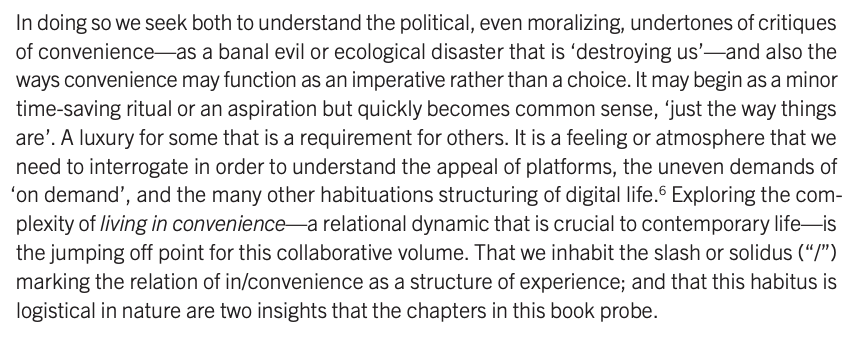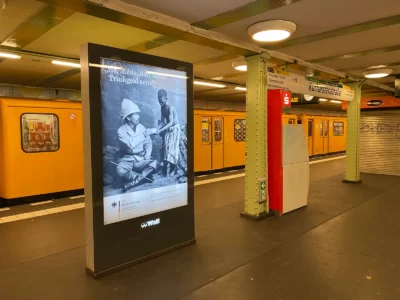Joshua Neves and Marc Steinberg (Ed.) || Theory on Demand #54
“Convenience is the feeling and aspiration that animates our platformed present. As such, it poses urgent techno-political questions about the everyday digital habitus. From next-day delivery, gig work, and tele-health to cashless payment systems, data centers, and policing – convenience is an affordance and an enclosure; our logistical surround. Driving every experience of convenience is the precarious work, proprietary algorithms, or predatory schemes that subtend it. This collaborative book traces how the logistical surround is transformed by thickening digital economies and networked rituals, examining contemporary conveniences across a wide range of practices and geographies. Contributors examine the ineluctable relation between convenience and its constitutive opposite, inconvenience, considering its infrastructural, affective, and compulsory dimensions. Living in convenience is thus both a hyper visible manifestation of so-called late capitalism and a pervasive mood that fades into the background (like the data centers that power it). Bringing the agonistic relation of in/convenience to center stage, this volume analyzes the logistics of delivery, streaming porn, cloud computing, water infrastructures, smartness paradigms, convenience stores, sleep apps, surveillance, AI ethics, and much more – rethinking the cultural politics of convenience for the present conjuncture.”

Een aantal quotes:
“Convenience is perhaps one of the most overused terms to describe where we are going, why we are using a given digital tool, and what the world of smart devices offers in exchange for our data, our money, our lives. Overused, and under-theorized. … There is an escalating need to theorize convenience to meet the escalating demands for convenience. So too the ways the convenient intersects with deeply felt obstacles or untimeliness. The need to scrutinize these relations is the starting point for this book, and hopefully other work that will follow from it, exploring convenience in the age of algorithms, platforms, and other logistical operations.” (Intro)
“Convenient devices allow for better management of time. They are not about saving time as such but rather about the ways modern conveniences allow for a control over the timing of domestic activities. Timing over time.” (Joshua Neves and Marc Steinberg)
“Turning our attention from appliances to services underlines the unequal distribution of convenience, including the complex ways it is generated and consumed. These positions are not mutually exclusive; a convenience store employee or Meituan food delivery worker is still a consumer at the end of their shift. The reformulation of labor and exploitation in terms of inconvenience also draws on a lineage of ideas that frame, if somewhat ironically, global climate change (The Inconvenient Truth) and settler colonialism (The Inconvenient Indian) as inconvenient. What it means to adopt the language of inconvenience in doing so requires further exploration, but signals the political hold that convenience has on the imagination of counter-politics.” (Darren Byler)
“The People’s Convenience surveillance system, it appeared, was pushing Uyghurs from their homes and jobs in the service and construction sectors of the city to repurpose an older platform on which the People’s Convenience system was literally stacked (or positioned directly beside)—the distributed network of on-demand cash withdrawal banking booths built to shelter computerized banking equipment. The layers of the city financial infrastructure meeting security infrastructure—formed a new segment in the enmeshed convenience city; a material and digital instantiation of what the theorist Benjamin Bratton might refer to as a megastructure of stacked digital and material platforms. Uyghurs were pushed to reclaim spaces in the platform stack where they waited to be stumbled over by system-approved citizens and swept up by the police who followed.”
“Convenience appears to be a memory of the past. Climate crisis, geo-political instability, economic volatility, and technical change all make the ideals of labor, lifestyle, and comfort that originally defined the term ‘convenience’ seemingly no longer achievable.” (Orit Halpern)
“More recently, Bernes has rephrased his critique of central planning, noting—in a similar vein to the analysis above—that the efficacy of central planning requires ‘both surveillance and automatic coercion’ and thereby ‘reproduces much of what we find intolerable about capitalism’. His contention is that a ‘truly emancipatory revolution’ requires ‘the distribution of power throughout society’; implying that Amazon’s logistical convenience cannot be part of this politics.” (Armin Beverungen)
“As centralized distribution platforms, porn tube sites offer the promise of convenience. For users, this promise is one of abundant content to choose from; for content producers, vast volumes of potential consumers. That the actual deal is less convenient for creators with limited means to monetize their videos, and for independent sites to compete with hubs is, of course, a different matter. And while the hubs of online porn may not be convenient customers for PSPs, they hold a different kind of sway in having access to these infrastructures from which creators themselves are routinely excluded.” (Susanna Paasonen)
“platform-based optimization, whether in the forms of a government system for revenue collection or a remittance application, is predicated on heightening the convenience of hitherto complicated, fragmented, and frictional infrastructural systems.” (Andrea Pollio & Liza Rose Cirolia)




